They treated us as if we are not human, but even animals are not treated in the same treatment
| 01.05.2020 | near Jagrovac, Croatia | No Name Kitchen | 45.212103, 15.735006 | Croatia | Bosnia | no | no | yes | yes | no | no | no | 17 - 21 | 10 | Morocco, Algeria | 10 | beating (with batons/hands/other), kicking, pushing people to the ground, gunshots, forcing to undress, destruction of personal belongings, reckless driving | 2 male Croatian officers with black uniform with Croatian emblem, ski masks, boots covering the shin up to the knees, bulletproof protection, guns and batons; 2 male police officers with blue uniforms and Croatian emblem, 1 police van; 6 male Croatian officers wearing black uniform |
The respondents in this case were three people (aged 17,19,21). Two came from Algeria and one came from Morocco. The group of three were stopped in Croatia by two male Croatian officers a few kilometers from the Slovenian border (approximately 45.749425, 15.432576 (HR)), at around 23.00 on the 4th January 2020. The respondent says that the officers were wearing black uniforms and ski masks, boots covering the shin (up to the knees), bulletproof protection, guns and batons.
The officers allegedly had the Croatian emblem on their sleeve arm of their uniform. The respondent reports the police shouting at them “stop” and shooting once in the air with a gun. The transit group stopped and the police forcibly pushed them prone to the ground, after ordering them to take off their jacket. In that position, the police beat the respondents with batons and kicked them all over their body. The respondent says that they laid on the ground in the cold night for what they perceived as one or two hours.
Another two male police officers wearing blue uniforms with the Croatian emblem on their arm arrived with a police van, loaded the respondents and directly drove them to the border to Bosnia Herzegovina (approximately 45.212103,15.735006). The respondent assert that the travel took two or three hours, and report the police driving reckless. In the police van there were another seven people from Algeria and Morocco, brining the total transit group to ten.
At around 02.00 on the 5th December 2020, the police van arrived at the border with Bosnia Herzegovina and the group of ten were released out of it “one by one”. Out of the van, six male Croatian officers wearing black uniform were waiting for the transit group. The officers had arranged themselves in circle, surrounding each respondent one by one, and beating them with batons and hands and kicking them all over the body. Several injuries were incurred from the two seperate beatings, including the fracture of one persons arm.
[caption id="attachment_14128" align="aligncenter" width="340"]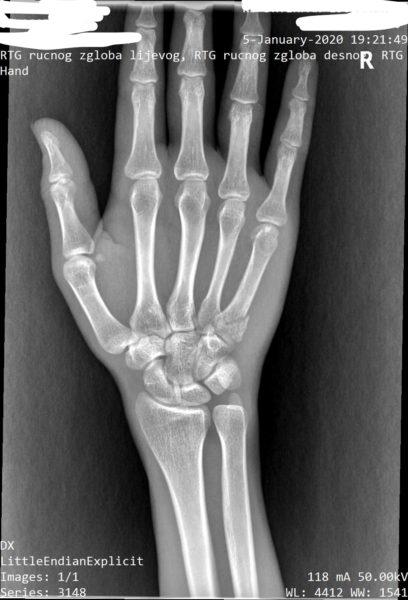 X-ray, R hand[/caption]
[caption id="attachment_14127" align="aligncenter" width="268"]
X-ray, R hand[/caption]
[caption id="attachment_14127" align="aligncenter" width="268"]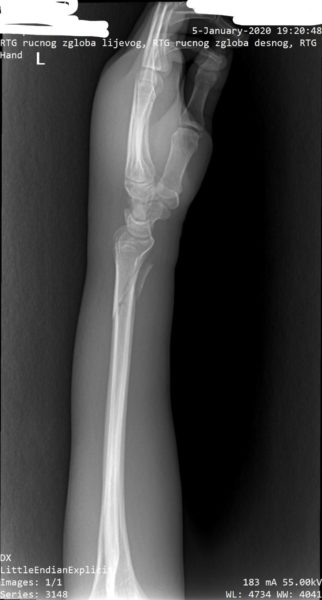 X-ray, L arm[/caption]
[caption id="attachment_14126" align="aligncenter" width="245"]
X-ray, L arm[/caption]
[caption id="attachment_14126" align="aligncenter" width="245"]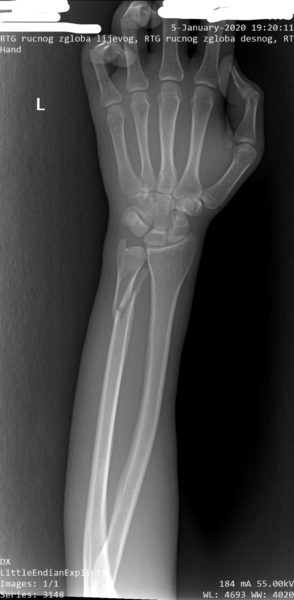 X-ray, L arm[/caption]
Describing the level of violence at this point in the incident, one respondent emphasized how:
X-ray, L arm[/caption]
Describing the level of violence at this point in the incident, one respondent emphasized how:
The police forced the respondents to take off their trousers. The clothes were then set on fire and the transit groups phones were crushed with batons. Describing the assault and stripping, one respondent shared:“In the border it’s very very very”
“Go, go, go”, the police told to the respondents. From the point they were pushed back, the respondents walked back half naked to the town of Velika Kladusa (BiH) under the pouring rain, with great difficulty due to the serious injuries caused by police. “Cold, cold cold cold”, said one respondent in reference to this return walk. In Velika Kladusa the group sought medical help from volunteer paramedics. The diagnosis and treatment made by this field team goes as follows:“They treated us as if we are not human, but even animals are not treated in the same treatment”
[caption id="attachment_14116" align="aligncenter" width="376"]Translation made by respondent on phone to describe the stripping, beating and theft.[/caption]
Additional treatement was sought at the hospital, where the above xray images were taken to assess the arm fracture, and splinting + bandaging was administered for the injury. [caption id="attachment_14113" align="aligncenter" width="888"]“The first young man presented bruises in the neck and acute pain due to impacts in this area and inflammation in the lower back due to police beatings with the batons and kicks.The second young man had bruises on both legs due to impact of the batons. The third young man presented a cut in the left leg due to the impact of the baton and inflammation; on the other hand, he presents a radius and scaphoid fracture in the left hand, and a fissure in the right hand. The three young people presented acute general pain and bruises in various areas due to police beating. All have required medical examinations and health first aid care, anti-inflammatory cures and analgesic medications, and psychological first aid due to a post-traumatic situation”.
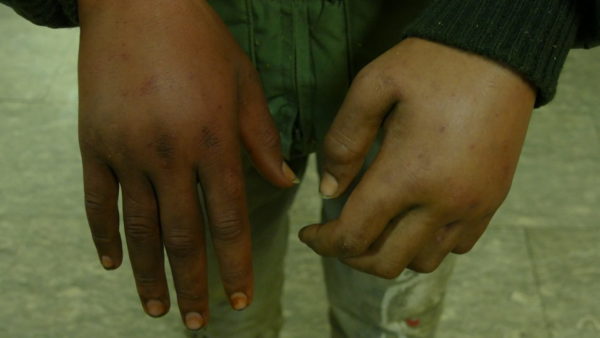 Swelling of hands from impact blows.[/caption]
[caption id="attachment_14115" align="aligncenter" width="375"]
Swelling of hands from impact blows.[/caption]
[caption id="attachment_14115" align="aligncenter" width="375"]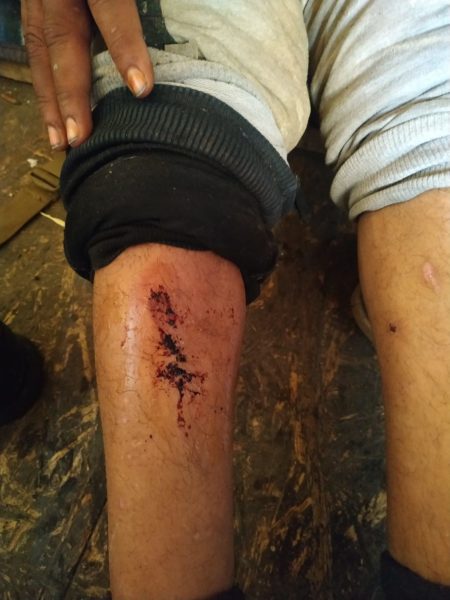 Scaring to right shin from assault.[/caption]
[caption id="attachment_14114" align="aligncenter" width="888"]
Scaring to right shin from assault.[/caption]
[caption id="attachment_14114" align="aligncenter" width="888"]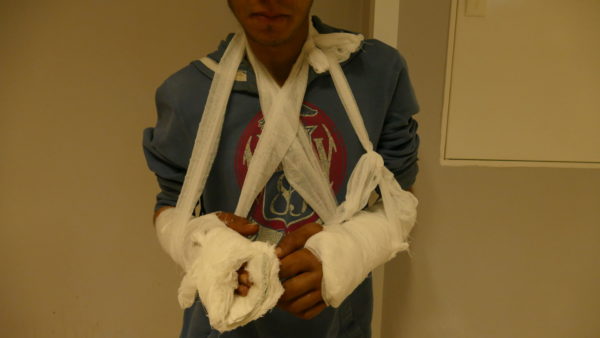 Treatment for multiple bone fractures, to hand and forearm.[/caption]
Treatment for multiple bone fractures, to hand and forearm.[/caption]
